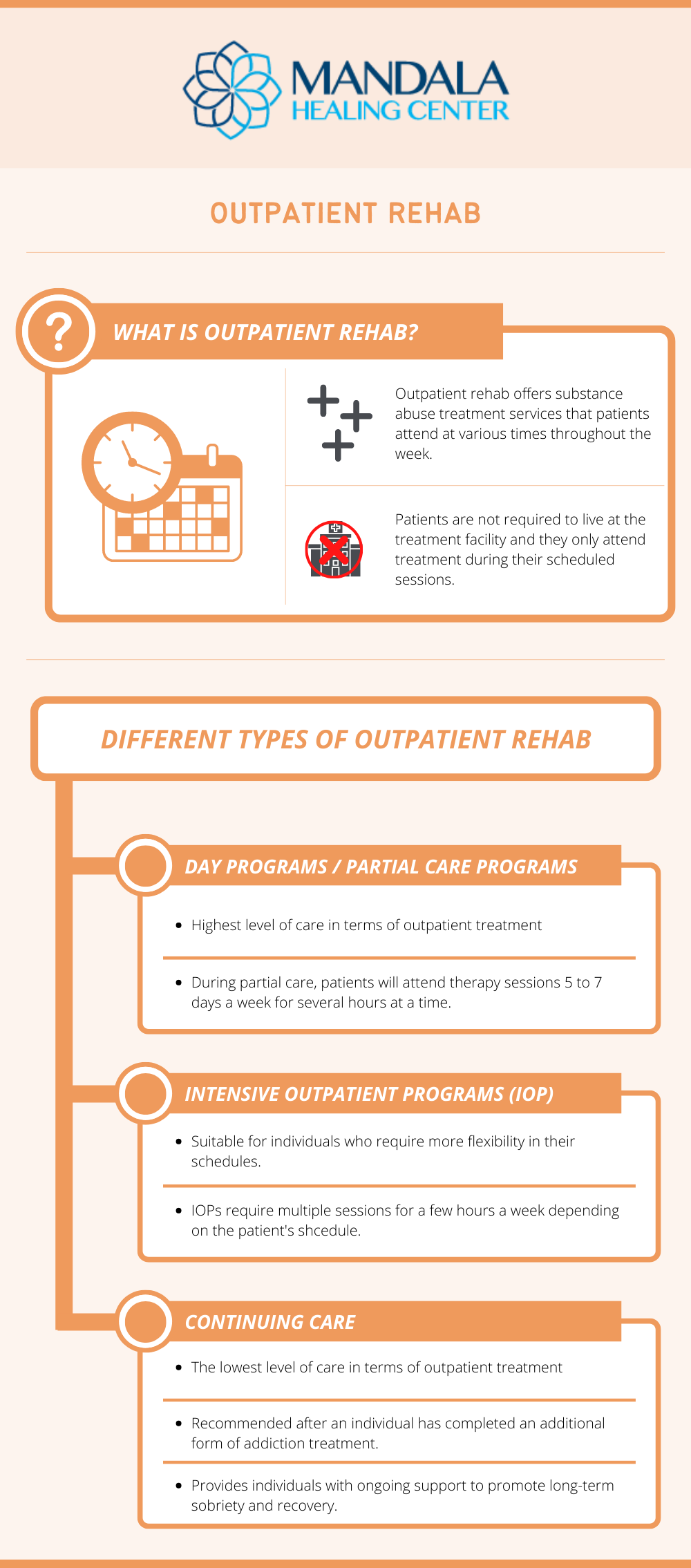Addiction is a devastating condition that is, unfortunately, extremely common in the United States. According to the National Center for Drug Addiction, “53 million or 19.4% of people 12 and over have used illegal drugs or misused prescription drugs within the last year.”[1]
Individuals who struggle with addiction must attend addiction treatment programs that provide a combination of evidence-based individual and group counseling services. However, there are many different types of addiction rehab facilities to choose from.
The main types of treatment include:
- medical detox
- inpatient treatment (residential rehab)
- intensive outpatient programs (IOP)
- outpatient programs (OP)
If you struggle with addiction, it can be difficult to determine which type of rehab to attend. If you are considering attending an outpatient rehab facility, it is important to consider whether this form of treatment is right for you.

What is Outpatient Addiction Treatment?
Outpatient addiction treatment or an outpatient program (OP) is a form of substance abuse treatment that allows you to live at home while receiving treatment services. Typically, you would attend treatment sessions multiple days throughout the week that include individual therapy and group counseling sessions.
Outpatient rehab includes medical services such as medication management, treatment for co-occurring disorders, individual therapy, group counseling, and relapse prevention planning. While this form of treatment provides the same services as inpatient treatment, it is done with much less intensity. In other words, if you suffer from severe forms of addiction and co-occurring disorders, you should attend an inpatient facility before attending outpatient rehab.
The benefits of outpatient treatment include:
- More affordable than inpatient rehab
- Flexibility to attend work, school, or care for children
- Access to family members and other forms of support throughout treatment
Signs that Outpatient Treatment is Right for You
If you are considering outpatient rehab, it is important to consider whether you are a good candidate for this form of treatment. Because you are not required to live on campus, it provides you with less accountability and more freedom. This could be a good thing if you have to continue working, however, if you are more prone to relapsing, the lack of accountability could cause issues.
Here is how you know if outpatient rehab is right for you.
You Have a Strong Support System
Because outpatient treatment allows you to return home at night, it is important to have a strong support system. If you live in a household where alcohol and drug use is prevalent, attending an outpatient program might not be the best idea. However, you could attend a sober living housing program simultaneously to ensure that you are living in a safe environment during treatment.
You are Highly Motivated to Recover
The freedom provided during outpatient rehab requires you to be highly motivated to recover. This means that individuals who are on the fence about sobriety should consider attending a residential treatment program before enrolling in outpatient treatment.
Your Addiction is Not Severe
It is important to consider the severity of your addiction before choosing outpatient rehab. Thankfully, there is a diagnostic tool that you can utilize to determine whether your substance use disorder is mild, moderate, or severe.
The criteria for a substance use disorder include:
- Consuming larger amounts or using substances longer than you intended to
- Being unable to quit or slow down your substance abuse
- Spending a lot of time getting, using, or recovering from substance use
- Experiencing cravings and urges to use drugs or alcohol
- You cannot keep up with home, work, or school responsibilities because of substance misuse
- You have given up important social, occupational, or recreational activities to have more time to abuse drugs and alcohol
- Continuing to abuse drugs and alcohol despite facing negative consequences
- Continuing to use despite worsening physical or psychological conditions
- Needing to increase the dosage of the substance to experience the desired effect (tolerance)
- Developing withdrawal symptoms that occur when you stop or cut back on using substances (dependency)
If you identify with two or three of the above-mentioned symptoms, you are struggling with a mild substance use disorder. Four to five symptoms indicate that you struggle with a moderate substance use disorder. Lastly, six or more symptoms would point to a severe substance use disorder.
If your addiction is mild or moderate, outpatient treatment could be right for you. It is also important to consider whether you struggle with significant mental health issues that require extensive treatments, as this would be better addressed in a residential setting.
You Already Completed Inpatient Treatment
Lastly, outpatient rehab could be used as a part of a continuum of care. Many individuals attend medical detox, inpatient treatment, intensive outpatient programming, and outpatient treatment in a sequence with one another. This would provide you with a strong foundation of recovery and all of the tools you need to maintain long-term sobriety.
If you have completed detox or inpatient treatment and still feel like you need some help recovering, outpatient treatment may be right for you.
Get Connected With a Top-Rated Outpatient Drug & Alcohol Rehab in West Palm Beach, Florida
Addiction and alcoholism are difficult conditions to deal with, especially if you are attempting to recover on your own. Thankfully, addiction treatment programs can provide you with all of the tools you need to recover.
If you or a loved one suffers from a substance use disorder, contact Mandala Healing Center today. We can help you achieve sobriety and learn to maintain long-term sobriety and overall happiness.
References:












